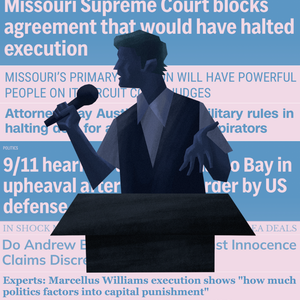
Alabama has set a November 17, 2022 execution date for a death-row prisoner whose jury voted 11 – 1 to spare his life.
On September 30, 2022, barely a week after the botched attempted lethal injection of Alan Miller, the Alabama Supreme Court granted a motion by state prosecutors to issue a death warrant for Kenneth Smith. Smith, now 57, was sentenced to death in 1996 when his trial judge overrode the jury’s near-unanimous recommendation for a life sentence. At the time, Alabama was one of only three states to permit judges to override a jury’s vote for life and impose a death sentence. By the time the Alabama legislature repealed that portion of its death penalty statute in 2017, no other state permitted the practice.
Smith and his co-defendant John Forrest Parker were sentenced to death for the 1988 contract killing of Elizabeth Sennett. The victim’s husband, Reverend Charles Sennett, allegedly paid each man $1,000 for the killing, and a week later died by suicide. Parker was executed in 2010. Smith was first sentenced to death in 1989, when the trial court imposed the death penalty after his jury voted 10 – 2 in favor of death. His conviction was reversed on appeal in 1992 because his prosecutor unconstitutionally struck Black jurors on the basis of race.
Smith was retried and again convicted in 1996, but eleven of the jurors voted to recommend he be sentenced to life. Trial judge M. Pride Tompkins ignored their recommendation, and in May 1996 imposed a death sentence. In response to a defense motion for a new trial, Judge Tompkins explained his override by asserting that the jury purportedly had been “allowed to hear an emotional appeal from the defendant’s mother.” The trial record established that this “emotional appeal” consisted entirely of Linda Smith’s unobjected to testimony about her son’s family background, character, and upbringing.
“If Smith’s trial had occurred today, he would not be eligible for execution,” a federal appeals court wrote in 2021.
In a petition for certiorari filed in the U.S. Supreme Court in October 2021, Smith noted that Judge Tompkin’s stated reason for overriding the jury’s life recommendation was “nearly identical to those the same trial judge offered for overriding the jury’s sentencing verdict in a different case involving a different defendant and different facts.” In that case, Smith wrote, “the trial court discounted the jury’s sentencing verdict because ‘the Jury was allowed to hear an emotional appeal from the defendant’s wife.’”
Smith asked the Court to review the constitutionality of the trial court’s override of the jury’s recommendation “based on the same rationale the trial judge later offers to justify overriding the jury’s sentencing verdict in a different case involving a different defendant and different facts.” The Court denied his petition on February 22, 2022.
In a 2019 study published in the Annual Review of Law and Social Science, Michael Radelet and Ben Cohen found that, at that time, 100 defendants were on death row due to death sentences imposed by a judge, and another 18 prisoners were executed after a judge overruled the jury’s vote in favor of a life sentence. Radelet and Cohen wrote, “[b]y any measure, the judge-imposed sentences … stem from an anachronistic vestigial process from a period from which the country has evolved.” The “most significant question remaining,” they wrote, “is of retroactivity” and “whether the evolving standards of decency prohibit the execution of judge-imposed death sentences.”
The practice of judicial override in capital cases was outlawed by the Alabama state legislature in April 2017. Prior to its repeal, the practice was a significant source of controversy, especially in Alabama.
In a 2016 article in the Yale Law Journal Forum, lawyers Patrick Mulvaney and Katherine Chamblee of the Southern Center for Human Rights report that in Alabama, the only state that still permitted judges to override a jury’s recommendation for life, override cases accounted for less than a quarter of death sentences but half of death row exonerations. Data from other states suggests a link between judicial overrides and wrongful convictions, as well.
A 2011 report by the Equal Justice Initiative (EJI) in Alabama found judges in the state have overridden jury recommendations 107 times since 1976; judges overruled life verdicts in favor of death sentences in 92% of these instances; and 20% of defendants on Alabama’s death row were sentenced through judicial overrides. The report also found that political considerations influence the practice, with the use of judicial override increasing during election years, which aligns with Alabama’s history of electing prosecutors and judges with “tough on crime” platforms. “In 2008, 30% of new death sentences were imposed by judge override, compared to 7% in 1997, a non-election year. In some years, half of all death sentences imposed in Alabama have been the result of override,” EJI reported. Judicial override also has been tainted by racial bias, with judges more likely to override a recommendation for life in cases involving white victims. “Seventy-five percent of all death sentences imposed by override involve white victims, even though less than 35% of all homicide victims in Alabama are white,” EJI said.
If Smith is executed, it will be Alabama’s first execution since the multi-hour botched execution attempt of Alan Miller on September 22, 2022. Alabama has refused to acknowledge that there were any problems during its failed attempt to execute Miller, its 2018 failed attempt to execute Doyle Hamm, and the three-hour period in which executioners failed at least 7 times to set an IV line during the execution of Joe Nathan James.
CBS News, Alabama sets execution date in 1988 contract killing of pastor’s wife that led to two death sentences and one suicide, October 4, 2022; Lee Hedgepeth, A jury recommended life in prison for Kenneth Eugene Smith. Alabama is set to execute him Nov. 17, WIAT, September 30, 2022.
Arbitrariness
Oct 04, 2024

A Chance at Life, Withdrawn: When Politics Interferes with Plea Deals
Arbitrariness
Aug 06, 2024

